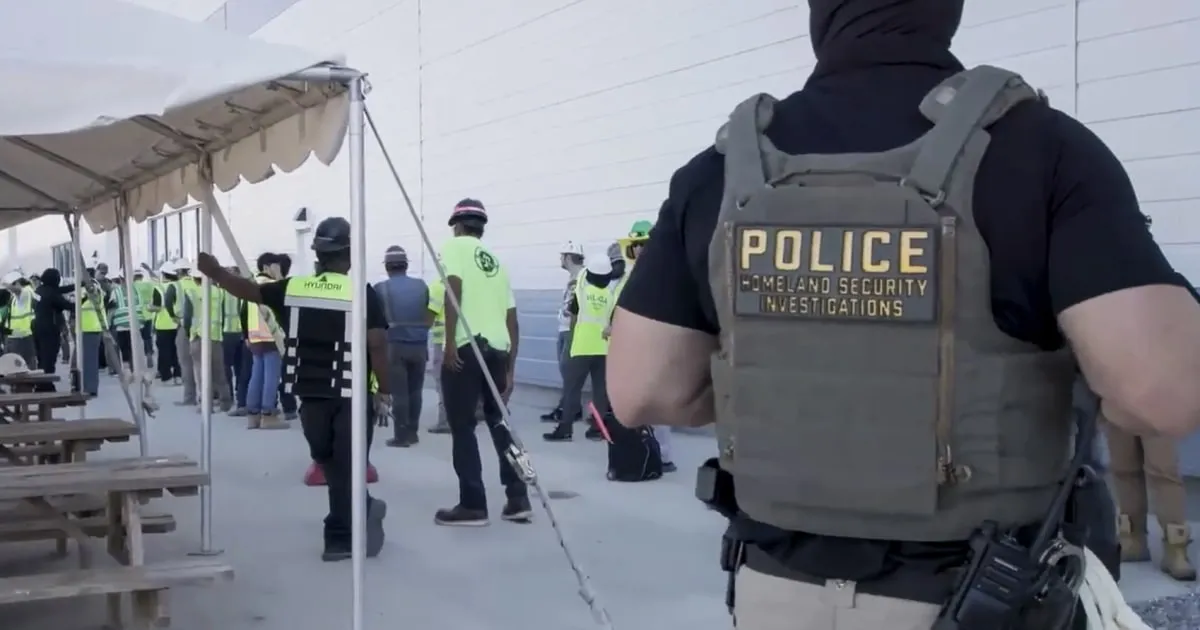
On Thursday, a significant intersection of President Donald Trump’s immigration and economic agendas occurred, as federal authorities conducted an immigration raid at a Georgia construction site linked to a Hyundai electric vehicle battery plant. This operation is particularly noteworthy as Trump is currently negotiating to secure $350 billion in investments from South Korea as part of a larger trade agreement aimed at revitalizing U.S. domestic manufacturing with American-born workers while simultaneously enforcing strict measures against foreign-born laborers.
The immigration raid resulted in the arrests of nearly 500 workers, over 300 of whom were identified as South Korean nationals. This prompted significant concern in Seoul, which is now collaborating with U.S. law enforcement to facilitate the return of those workers to their home country. In response, Hyundai, one of South Korea’s largest corporations, expressed its commitment to comply with all laws and regulations, clarifying that "none of those detained is directly employed by Hyundai Motor Company."
Hyundai is a major player in the U.S. automotive market, ranking as the fourth best-selling automaker in the nation, following General Motors, Toyota, and Ford. The company emphasized its dedication to American manufacturing, stating, “As we continue to invest in American manufacturing and create thousands of jobs, we will do so in full accordance with U.S. law and in a manner that reflects our values of treating all people with dignity and respect.” However, Hyundai refrained from commenting on whether the recent immigration raid would impact its future plans.
Additionally, LG Energy Solution, which is collaborating with Hyundai in a joint venture to operate the factory, has reportedly decided to postpone the commencement of production until the first half of 2026. Both LG Energy Solution and the joint venture did not respond immediately to requests for further information. South Korean Foreign Minister Cho Hyu expressed concerns to lawmakers, stating, “I will make it clear that if completion of the factory is delayed, the United States will also suffer significant losses.”
Despite these concerns, Trump dismissed the notion that the raid could negatively affect U.S.-South Korea relations, asserting, “No, we have a great relationship with South Korea.” The South Korean government is in discussions with the Trump administration to finalize a framework trade agreement, wherein South Korea is expected to purchase $100 billion worth of U.S. energy products and invest $350 billion domestically. The specifics of this investment remain ambiguous, although Trump has indicated that he would have the discretion to allocate those funds as he sees fit.
Following the Hyundai raid, Trump took to Truth Social to address foreign companies operating in the U.S., stating, “Your Investments are welcome, and we encourage you to LEGALLY bring your very smart people, with great technical talent, to build World Class products, and we will make it quickly and legally possible for you to do so.” This aligns with other high-profile projects promoted by Trump, including semiconductor factories and AI data centers, which may necessitate visas for specialized workers.
An Immigration and Customs Enforcement (ICE) spokesperson commented on the operation, saying, “This operation underscores our commitment to protecting jobs for Georgians, ensuring a level playing field for businesses that comply with the law, safeguarding the integrity of our economy, and protecting workers from exploitation.” Tom Homan, Trump’s border czar, mentioned on CNN that the administration plans to conduct “a lot more worksite operations,” although he did not specify which businesses might be targeted.
Trump’s economic and immigration policies often seem contradictory. On Friday, the Labor Department reported a slowdown in job growth, indicating a cooling economy, while the administration highlighted a decrease in foreign-born workers. Various sectors, including farms in California and meatpacking plants in Nebraska, faced ICE visits, resulting in protests from industries that rely on these workers. Many farmers have reported difficulties in replacing skilled labor due to the administration's stringent immigration policies.
In June, Trump acknowledged the challenges faced by American farmers, stating, “Our great Farmers and people in the Hotel and Leisure business have been stating that our very aggressive policy on immigration is taking very good, long-time workers away from them.” After a brief pause, ICE resumed visits to various industries, including farms and hotels, after initially halting them.
This past weekend, Trump conceded that the administration would have to consider granting visas to overseas workers, particularly those capable of training U.S. employees in specialized sectors, such as the battery factory industry. He remarked, “We’re going to have to train people. And the way you train people is to bring people in that know what they’re doing and let them stay for a little while and help.”
Trump has highlighted the Hyundai factory and related investments as proof that his administration’s economic agenda is effective, even if such facilities take years to yield tangible results. An analysis by Wells Fargo economists indicated that tighter immigration enforcement has likely reduced new entrants to the workforce, coinciding with a disappointing jobs report that showed only 22,000 jobs added in August. This trend suggests that stricter immigration policies are increasingly constraining labor supply, as noted by EY’s chief economist.